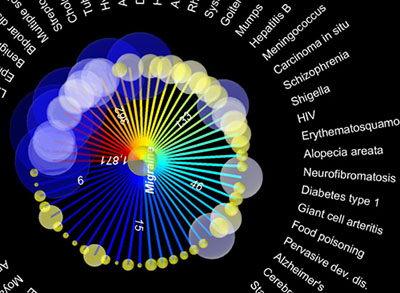Most folks who wake up feeling crummy will sit down with a computer or smartphone before they sit down with a doctor.
They might search the Web for remedies or tweet about their symptoms. And that’s why scientists who track disease are turning to the Internet for early warning signs of epidemics.
Philip Polgreen, an epidemiologist at the University of Iowa, told NPR’s Adam Cole, "Surveillance is one of the cornerstones of public health. It all depends on having not only  accurate data, but timely data."
accurate data, but timely data."
The current system requires the Centers for Disease Control and Prevention to compile reports about from physicians and labs all over the country — and that can take a while. There’s typically a week-long delay between an outbreak and the release of an official report.
To get an early read on things, epidemiologists look for the first clues of illness — a rise in thermometer sales or increased chatter on hospital phone lines. Now, they’re tapping into the Internet.
A team of researchers at Johns Hopkins wanted to see if Google’s estimates would prove accurate and useful in the everyday operation of a hospital.
They compared Google searches originating in Baltimore to the number of patients who showed up with flu-like symptoms at a local emergency room.
"It seems like a stretch, but what we found — amazingly — is that there’s a really high correlation between these searches in the community and what we’re seeing in hospitals," says Richard Rothman, the study’s co-author.
Online disease surveillance — or "Webidemiology" — is a cool new tool, and researchers are eagerly testing it out and double-checking the data they collect. But it won’t be used by itself to make important public health decisions anytime soon.
"The Internet is just one additional stream of information," Polgreen says. "It’s certainly not going to replace traditional forms of surveillance."
While the Internet may not be a perfect predictive tool, researchers and public health officials  agree that it is great for one thing: communication.
agree that it is great for one thing: communication.
Social networking allows officials to easily reach the public and enter into a conversation. Tweets, searches and Facebook posts can give officials a sense of public reaction to vaccines, or their attitude towards an epidemic.
"It’s a quick and easy barometer for public anxiety," Polgreen says.
And in a public health emergency, that can be just as useful as cold, hard numbers about cases.
